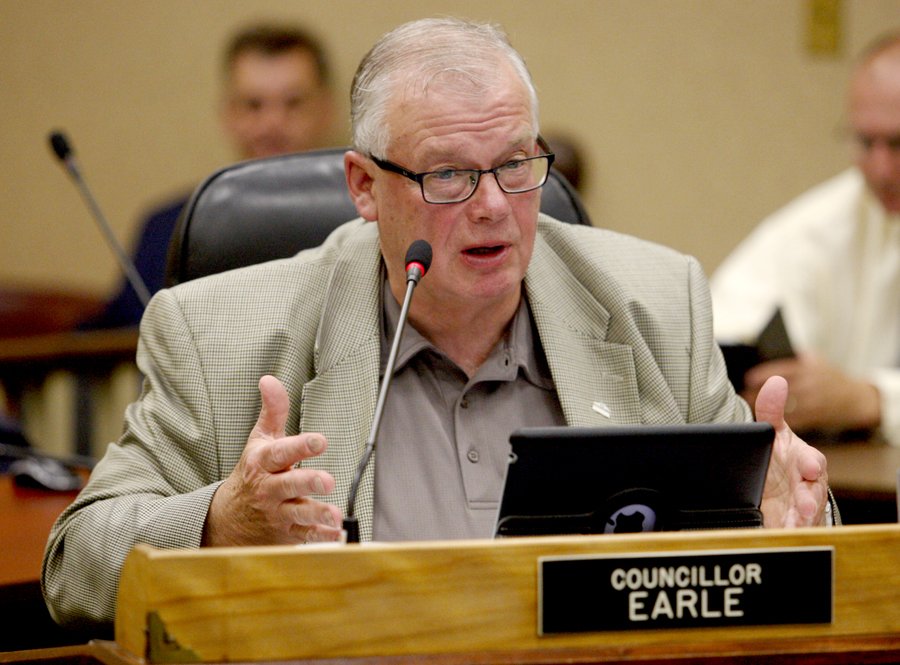The sky's not falling, but it's getting darker

(Councillor Jeff Earle speaks to city council on Tuesday.)
It’s a point, apparently, that bears repeating: The sky is not falling; hold your breath and count to ten.
Or, if you view the business of setting a council budget the way Jason Baker does, count to twenty.
But once you are done counting and start breathing again, get ready to pop a headache pill.
Baker brought a dose of sobriety to Tuesday’s early 2018 budget deliberations, which were, to be sure, weighted down by a great many worries.
To give you a brief version: The city is staring at a number of “risks,” or factors that may, or will, drive up costs in 2018.
Large commercial property owners have been winning big assessment appeals of late, a process that seems likely to continue, sapping the city’s revenue, while arbitration talks with firefighters, expected in the fall, could further deplete the treasury.
Meanwhile, the Wynne government is proceeding with labour reforms, not the least of them a steep minimum wage hike.
And that’s not even counting the $4.7 million the city has committed to paying Brockville General Hospital for its major expansion – a sum Baker openly discussed reducing on Tuesday.
“There’s no one in this room sitting comfortably in their chairs after that presentation,” said Councillor Jeff Earle, who warned the 2018 budget process is “not business as usual.”
So deep are the economic challenges ahead, Earle believes, that councillors need three more months to wrap their heads around them rather than set budget guidelines now. Council overruled him on that one.
All of these risks are worrisome, to be sure, but Baker told councillors Tuesday he has heard all of this before.
The top finance official, at the start of a budget process, is pretty much required to point out all the things that could go horribly wrong, said Baker.
“This is the treasurer’s job,” he said, referring to corporate services director David Dick’s gloomy budget forecast.
Were it not for all the aforementioned, he added, Dick would have probably made reference to the infrastructure gap or some other looming challenge.
“If the sky is falling, it’s operating budget time,” Baker quipped.
Things are bad now, but they’re not as bad as they were back when Sanmina-SCI closed down, or when the province downloaded a host of services, and their attendant costs, to municipalities, said Baker.
Those of us who’ve been around the block, said Baker, know that this gloom and doom is the same every year.
Of course, Earle, too, was going around the same block for all those major economic events, and he sees a much more worrisome picture today.
Having been around that block for most of those times myself, taking notes at the media table, I am inclined to suggest a middle ground by proclaiming that, while the sky is indeed not falling, there really is no longer such a thing as “business as usual.”
Baker is mostly right: Staff does come back with some sort of gloomy scenario at the start of every budget season.
It’s just that the depth of that gloom has varied from year to year, and this year’s is among the darker forecasts.
The sky is not falling, but it’s getting darker right around the time the city has to start reckoning with the closure of Procter&Gamble and the cost of the hospital expansion.
One must take these scenarios calmly. As Mayor David Henderson said Tuesday: “We are not collapsing.”
But there are, nonetheless, difficult times ahead, so complacency would be a mistake.
Earle pointed out that, while the city did recover from the more serious economic blows of the two previous decades, those recoveries produced smaller industrial employers and fewer jobs.
“We traded dollars for quarters,” said Earle.
“We are not in the position we used to be.”
What we’ve been experiencing is not so much a recovery as a transformation, the contraction of our industrial base and the rise in importance of the tourism, retail and industrial sectors, each of which face their own regular challenges.
Not only are we changing, but the world around us is as well, making it a constant challenge to evolve and find our place in it.
Regional economic development and efforts to create new development lands are among the ways we are trying to adapt and evolve.
So is, in council’s estimation, the decision to bump up the tax levy increase from two per cent to three.
These things are all departures, in some ways, from what has lately been business as usual.
And in the fall, we’ll find out what a three-per-cent levy increase will require of us in further departures from the usual.